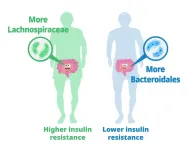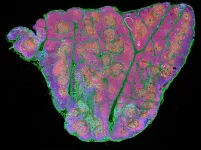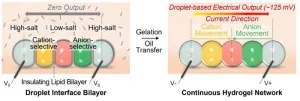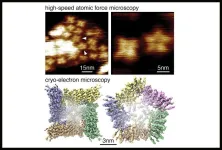(Press-News.org) CHAMPAIGN, Ill. — When an immunocompromised person’s system begins to recover and produce more white blood cells, it’s usually a good thing – unless they develop a potentially deadly inflammatory condition. New research from the University of Illinois Urbana-Champaign has found that the pulmonary distress often associated with the condition is caused not by damage to the lungs, but by newly populated T-cells infiltrating the brain.
Knowing this mechanism of action can help researchers and physicians better understand the illness and provide new treatment targets, said study leader Makoto Inoue, a professor of comparative biosciences at Illinois. The study was published in the journal Nature Communications.
Cryptococcus-associated immune reconstitution inflammatory syndrome, known as C-IRIS, happens when an immunocompromised patient is unknowingly infected with the fungus Cryptococcus. Once the patient’s immune system begins to rebuild, creating more T-cells, the infection sparks systemic inflammation.
C-IRIS frequently affects patients receiving antiretroviral therapy, recovering from chemotherapy, or recovering from a transplant, and also has been known to affect postpartum women or patients with multiple sclerosis – yet it remains difficult to diagnose, requiring ruling out other causes first, said study co-author Jinyan Zhou, a graduate student researcher at Illinois.
Wanting to understand more about the condition and its progression, the researchers developed a mouse model of the disease. To achieve this, they give injections of T-cells to immune-deficient mice preinfected with Cryptococcus, simulating what happens when the immune system starts producing higher levels of T-cells after being suppressed. The symptoms the mice developed – such as inflammation, fluid in the brain and pulmonary dysfunction – were in line with those of human patients.
“We saw a high number of T-cells infiltrating the brains in conjunction with the presence of pulmonary dysfunctions, so that told us they could be connected,” Zhou said. “In healthy conditions, there shouldn’t be that many T-cells in the brain, because those cells should primarily exist in the periphery with a small number of T-cells doing patrol and surveillance within the brain.”
When the researchers investigated further, they uncovered a chain of events leading the T-cells to invade the brain and affect breathing. The receptor CCR5 is implicated in HIV and cancer, and also found on the surface of T-cells. When the T-cell populations started to rise in the mice, the receptor promoted the white blood cells’ infiltration into the brain. In addition, the T-cells that had infiltrated the brain produced high amounts of two molecules known to cause damage to neurons in the regions of the brain that control respiratory function.
“Finding that the pulmonary dysfunction is due to neuron damage in the brain was a new way of seeing this condition,” Inoue said. “We know the brain controls may peripheral organs, but this is a notable idea for clinicians treating this syndrome. Normally, drugs are given to try to improve lung function, but they don’t work. Now we know it’s due to changes in the brain, so that gives us new treatment pathways to target.”
To verify this chain of events and identify potential treatment pathways, the researchers treated a set of mice with a drug that suppresses the CCR5 receptor. Both pulmonary function and neuronal development improved.
“We think this could have potential to be beneficial for C-IRIS patients as well, to prevent T-cell infiltration into the brain, and that in turn could prevent the symptoms from happening,” Zhou said. “We also could target those molecules that damage the neurons. For example, when patients are prescribed immunotherapies we could maybe manipulate those T-cells to decrease their expression of those molecules.”
Next, the researchers plan to further study other functions of the immune system in C-IRIS and how more systems in the brain and body interact with T-cells.
The National Institutes of Health supported this work via grant R01-AI136999.
Editor’s notes: To reach Makoto Inoue, email makotoi@illinois.edu.
The paper “T-cell infiltration into the brain triggers pulmonary dysfunction in murine Cryptococcus-associated IRIS” is available online.
DOI: 10.1038/s41467-023-39518-x
END
T-cells infiltrate brain, cause respiratory distress in condition affecting the immunocompromised
2023-08-30
ELSE PRESS RELEASES FROM THIS DATE:
The International Society of Microbiota will host a symposium dedicated to clinicians on probiotics and microbiota supplements applications in diseases
2023-08-30
Venice, Italy – The International Society of Microbiota (ISM) is pleased to announce the upcoming symposium on probiotics and microbiota supplements. The symposium will take place on October 17, 2023, in Venice, Italy, one day prior to the 10th World Congress on Targeting Microbiota 2023.
About ISM 2023 Symposium:
The symposium will focus on the strain specificity of probiotics and microbiota supplements and their clinical applications for disease management. It will also elaborate on the use and mode of action of postbiotics and metabolites like the SCFA butyrate.
Speakers will present the latest research on the use of probiotics to treat a variety ...
American Meteorological Society announces 2024 weather, water, and climate honorees
2023-08-30
[Boston, MA, USA—August 30, 2023] Each year, the American Meteorological Society recognizes outstanding individuals and organizations in the weather, water, and climate community through its Awards and Honors program. The organization is proud to announce its 2024 recipients, who will receive their award or honor at the 104th AMS Annual Meeting in Baltimore, Maryland, 28 January–1 February, 2024.
“Working across a wide range of sciences and services, the members of our community are vital to upholding safety and quality of life in the United States and across ...
Do driverless cars feel safe? New study shows gradual introduction needed to build comfort among all road users
2023-08-30
While self-driving vehicles (SDVs) are being hailed as a solution for safer, more efficient roads, new research suggests British Columbians are not quite ready to embrace self-driving cars wholeheartedly – and will need a period of gradual transition before adoption.
The study, conducted by the Research on Active Transportation Lab (REACT) at the University of British Columbia, reveals mixed perceptions of automated vehicles, particularly their effects on pedestrian comfort and safety.
Do self-driving cars feel safe?
Four out of 10 participants (41 per cent) thought that pedestrians faced reduced safety and comfort levels ...
MD Anderson research highlights for August 30, 2023
2023-08-30
HOUSTON ― The University of Texas MD Anderson Cancer Center’s Research Highlights showcases the latest breakthroughs in cancer care, research and prevention. These advances are made possible through seamless collaboration between MD Anderson’s world-leading clinicians and scientists, bringing discoveries from the lab to the clinic and back.
Recent developments include a novel computational tool to detect single base pair DNA changes in single-cell sequencing data, a potential target to treat hypertension caused by drugs commonly used in organ transplants, further insights into the steps involved in ...
Study finds high blood and urinary metal levels among exclusive marijuana users
2023-08-30
Research conducted at Columbia University Mailman School of Public Health detected significant levels of metals in the blood and urine among marijuana users, concluding that marijuana may be an important and under-recognized source of lead and cadmium exposure. This is among the first studies to report biomarker metal levels among marijuana users and most likely the largest study to date, that links self-reported marijuana use to internal measures of metal exposure, rather than just ...
Bacteria treatment reduces insulin resistance, protects against diabetes
2023-08-30
Researchers led by Hiroshi Ohno at the RIKEN Center for Integrative Medical Sciences (IMS) in Japan have discovered a type of gut bacteria that might help improve insulin resistance, and thus protect against the development of obesity and type-2 diabetes. The study, published August 30 in the scientific journal Nature, involved genetic and metabolic analysis of human fecal microbiomes and then corroborating experiments in obese mice.
Insulin is a hormone released by the pancreas in response to blood sugar. Normally, it helps get the sugar ...
Researchers identify stem cells in the thymus for the first time
2023-08-30
Francis Crick Institute press release
Under strict embargo: 16:00hrs BST 30 August 2023
Peer reviewed
Experimental study
Cells
Researchers identify stem cells in the thymus for the first time
Researchers at the Francis Crick Institute have identified stem cells in the human thymus for the first time. These cells represent a potential new target to understand immune diseases and cancer and how to boost the immune system.
The thymus is a gland located in the front part of the chest, the place where thymocytes (the cells in the thymus) mature into T ...
New ‘droplet battery’ could pave the way for miniature bio-integrated devices
2023-08-30
UNDER EMBARGO UNTIL 16:00 BST / 11:00 ET WEDNESDAY 30 AUGUST 2023
Researchers have developed a miniature battery that could be used to power tiny devices integrated into human tissues.
The design uses an ionic gradient across a chain of droplets – inspired by how electric eels generate electricity.
The device was able to regulate the biological activity of human neurons.
This could open the way to the development of tiny bio-integrated devices, with a range of applications in biology and medicine.
University of Oxford researchers have made a significant step towards realising miniature ...
Study finds how some ion channels form structures permitting drug delivery
2023-08-30
A member of an important class of ion channel proteins can transiently rearrange itself into a larger structure with dramatically altered properties, according to a study led by researchers at Weill Cornell Medicine. The discovery is a significant advance in cell biology, likely solves a long-standing mystery about an unusual feature of some ion channels and has implications for the development of drugs targeting these proteins and for drug delivery.
Ion channels are ubiquitous in the cell membranes of higher organisms. ...
Discoveries on memory mechanisms could unlock new therapies for Alzheimer’s and other brain diseases
2023-08-30
AURORA, Colo. (Aug. 30, 2023) – Scientists at the University of Colorado Anschutz Medical Campus have made a `paradigm shifting’ discovery on the mechanisms required for learning and memory that could lead to new therapies for Alzheimer’s disease and potentially Down syndrome.
The study was published Wednesday in the journal Nature.
For over 30 years, researchers believed that LTP or long-term potentiation, which is crucial for learning and memory, required enzymatic actions by an enzyme known as CaMKII.
But a team of researchers led by Ulli ...





